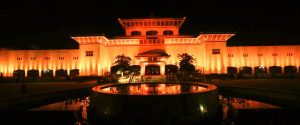In a further sign of continuing political turbulence in Nepal, President Bidya Devi Bhandari dissolved the country’s parliament on December 20 and announced fresh elections. Bhandari’s decision followed hours after Prime Minister K.P. Sharma Oli recommended the move after a meeting of his cabinet. Fresh elections will be held in April and May next year. Reuters quoted Nepal Communist Party (NCP) legislator Pampha Bhusa as saying that “Oli’s decision came after some lawmakers from his party registered a vote of no confidence against him in the 275-member lower house of parliament.”
Oli assumed office in 2017 through a power-sharing agreement with fellow NCP leader Pushpa Kamal Dahal, after two communist parties in Nepal, each led by Oli and Dahal, formed an alliance to fight elections, leading to the creation of the NCP the following year.
Bhandari’s decision to endorse the Oli cabinet’s recommendation to dissolve the parliament and call for fresh elections has outraged many in Nepal. According to Republica Nepal, former President Ram Baran Yadav has noted the move to be “unconstitutional,” a term that the NCP also used to describe it.
In an address to the nation on December 21, Oli sounded defensive about the decision to dissolve the elected parliament. The Indian Express quoted him as saying, “I was forced to seek a fresh mandate through elections as attempts were made against my government, not to allow it to function properly.” “Against the people’s mandate and their will, national politics was dragged into an endless and goalless direction by creating controversy, making Parliament meaningless as the elected government could not receive its support but always faced opposition and dragged into the controversy,” the newspaper quoted Oli as also saying during his address.
Since coming to power, Oli has promoted an aggressive strain of Nepalese nationalism that has taken aim at India, raising concerns in New Delhi. He has also courted China, so much so that many of the region’s observers now marvel at Beijing’s growing clout in the Himalayan country and its domestic politics. China’s ambassador to Nepal Hou Yanqi, who has maintained a very public profile in the recent past, had reportedly sought to mediate between Oli, Dahal and other warring leaders. The Chinese Defense Minister Wei Fenghe was in Kathmandu on November 29 – a visit many Indian analysts (somewhat predictably) interpreted as a “signal” to New Delhi.
India has also reached out to both Oli as well as other leaders, as India-Nepal relations has shown some signs of improvement over the past few months. During this period, Kathmandu has seen visits by the head of India’s lead external intelligence service, the chief of the Indian Army as well as the Indian foreign secretary. However, it is not known whether these high profile (and highly publicized) trips by Indian officials have managed to make a dent when it comes to the core dispute between India and Nepal – involving territorial claims. Tensions between the two countries have been particularly pronounced since May this year when the Indian defense minister inaugurated a new road from the Indian state of Uttarakhand to the China-India-Nepal trijunction in the Lipulekh pass. Nepal claims that the road pass through its territory. A new political map that was adopted by the Nepalese parliament by amending the country’s constitution in June this year shows three areas India also claims — Lipulekh, Kalapani and Limpiyadhura — as part of Nepal.
But it is not immediately clear who – if any – would be India’s preferred candidate as prime minister come next year; or even that India would be opposed to seeing a chastened Oli returning to power. For example, spy chief Samant Goel is said to have met with Oli as well as opposition leader Sher Bahadur Deuba and former Prime Minister Baburam Bhattarai during his Kathmandu trip on October 22. Similarly, it is reasonable to expect that Beijing too will be candidate-agnostic, like India, as long as its core interests in Nepal are preserved and can be furthered through domestic political stability. That said, it also fair to expect that both China and India will be watching the run-up to the elections in Nepal next year very closely.

































